A few weeks ago, blogmeister Joe Gresh vented on Bonnier and Motorcyclist magazine. It was a great piece of writing (not a surprise, seeing as it was coming from Gresh) and it garnered more than a few comments.
I thought that Motorcyclist had already gone belly up. I used to subscribe, and I thought my subscription had already ended, so I was more than a little surprised when I received the final issue in the mail last week. We checked our records and whaddaya know, we had renewed for a year, so now I’m annoyed that I’m apparently going to get stiffed for the last two issues (Motorcyclist didn’t say anything about reimbursing folks like me who are owed another issue or two). I guess the reason I was surprised was that with Motorcyclist’s recently-adopted quarterly print schedule, it had been so long since I received the last issue I assumed the subscription had already expired. Truth be told, the last few issues of Motorcyclist were terrible, I hadn’t read most of their articles after glancing at them initially, and I’m not missing Motorcyclist at all. It had become a collection of snowflake fluff.
Anyway, I looked through the last issue (the one I received last week) to see if they were making this a special issue (you know, because it was the last). Nope, not really. There was a brief article (less than a page) near the beginning that explained this was the last issue and it stated what I believe to be not more than a couple of half-assed excuses: The motorcycle industry has been in a permanent funk since the recession and nobody with any brains advertises in print media. It’s a digital world, Motorcyclist said, and motorcycling (as an interest, an endeavor, and an industry) is on life support (my words, but that’s essentially the Motorcyclist message). My take? These guys are good at making excuses. They’re right up there with that world-class, place-the-blame-anywhere-but-on-me hack who wrote What Happened. Blame it on the Russians, I guess.
The rest of the articles in the final Motorcyclist made no mention that this was the last issue, so my take on the whole affair is that it was a decision made suddenly. It’s a pity, as Motorcyclist used to be good. Really good. They had superb writing (including a regular column by a guy named Joe Gresh). But they failed to adapt. The market was changing and the coffee-table format and fluffy content Motorcyclist switched to a few years ago missed the mark by a mile. To their credit, they realized they had a problem, but their diagnosis and prescribed course of treatment was wrong. It’s that old joke: What do you call the student who graduates at the bottom of their medical school class? The answer, of course, is Doctor. Just having the title, though, doesn’t mean you know the right answers.
In the final analysis, I don’t buy what Motorcyclist said for the most obvious of reasons: There are good motorcycle magazines out there that are thriving. They’ve done a far better job of picking the right content, format, and market niche, and they are serving it well. One is Motorcycle Classics, with a focus on classic motorcycles. Another is RoadRUNNER, with a focus on touring. Rider may be in that category, too (I haven’t looked at them lately). And there’s Buzz Kanter’s American Iron magazine, with a focus on custom and vintage mostly-made-in-America motorcycles. I believe there are several things that inoculate these publications to the double whammies of a depressed motorcycle market and the brave new digital world. The first is that each is led by passionate riders. Think Landon Hall at Motorcycle Classics, the Neuhausers at RoadRUNNER, and Buzz Kanter at AIM. These are folks who ride, who tour, who love motorcycles, and who live in our world (and that comes across in their magazines). The second huge factor is that each of these magazines found a niche that doesn’t need to scoop the competition. If you’re in the printed magazine business and you need to be the first to publish breaking news, you’ll never beat the Internet. Nope, each of these magazines went a different route. Vintage bikes aren’t bold new graphics or the latest race results (let the Internet break that kind of baloney). Touring is not breaking news and that’s why RoadRUNNER does well. And custom, or vintage, Harleys and Indians…well, that’s the same deal: American Iron has what is essentially a timeless topic. And then there’s one last factor, I think, and it is that each of these magazines has superior editorial direction. The articles are profoundly interesting, well-written, error-free, and skillfully presented. Landon, Florian, and Steve are gifted editors who take their life’s work seriously, and if you didn’t know, they are the editors of Motorcycle Classics, RoadRUNNER, and American Iron.
Nope, the demise of Motorcyclist is unfortunate, but it’s of their own doing. Cream always rises to the top, flawed strategies ultimately fail, and the Russians had nothing to do with it.

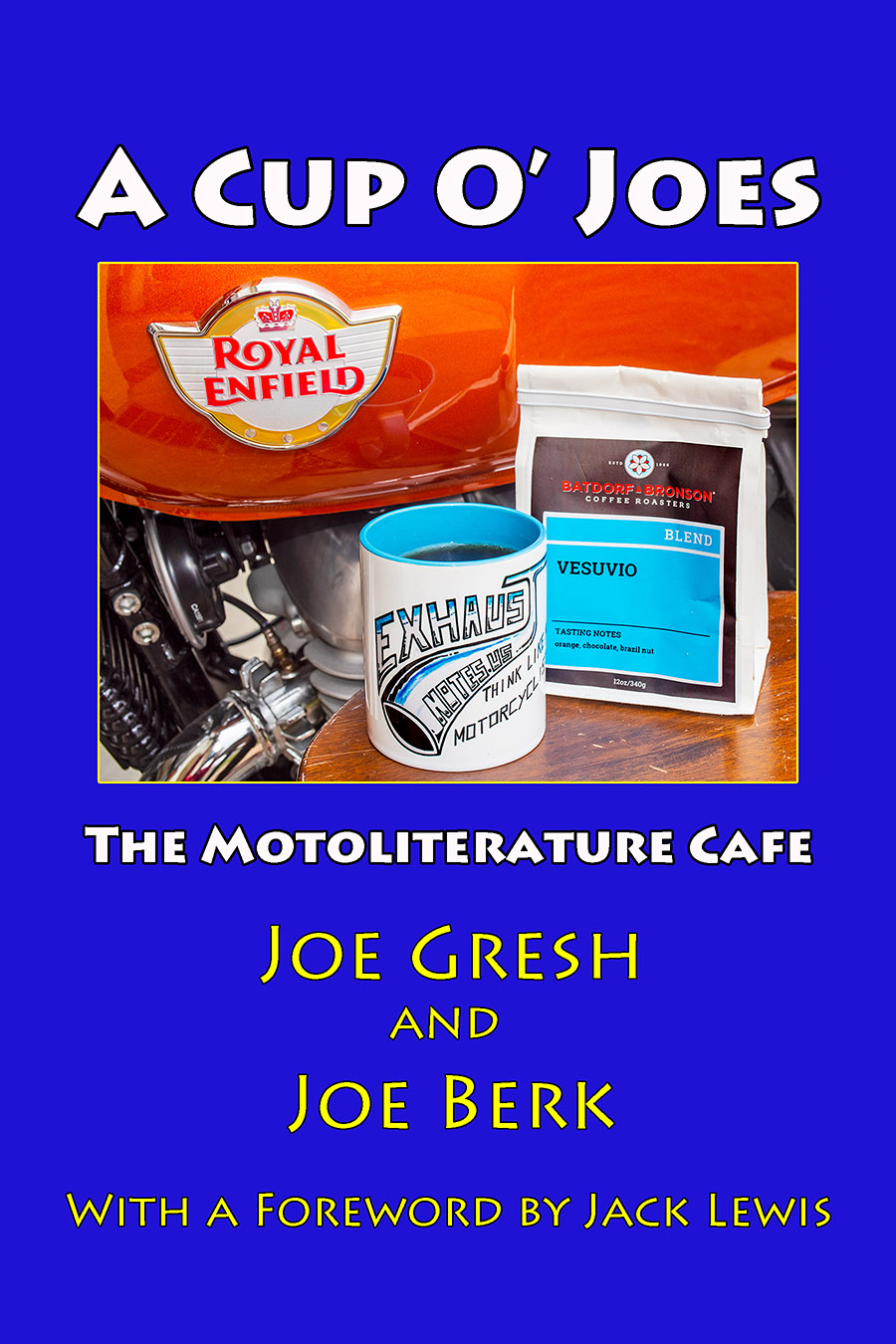



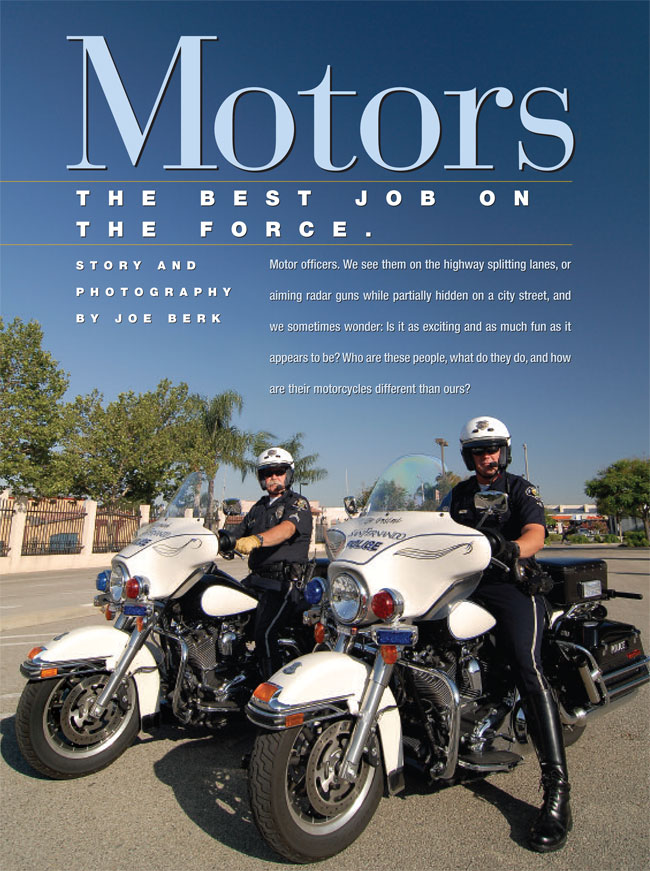
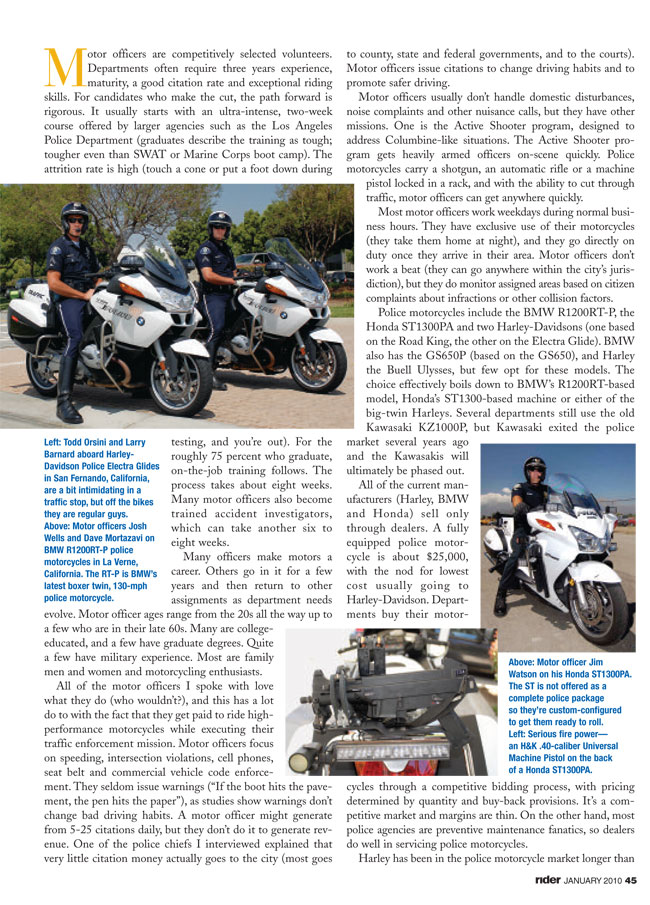
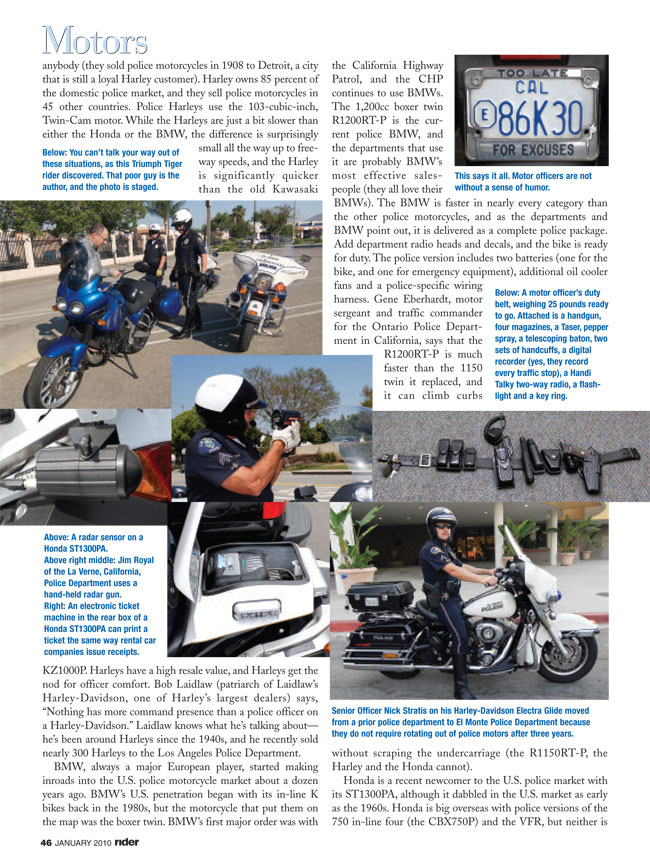
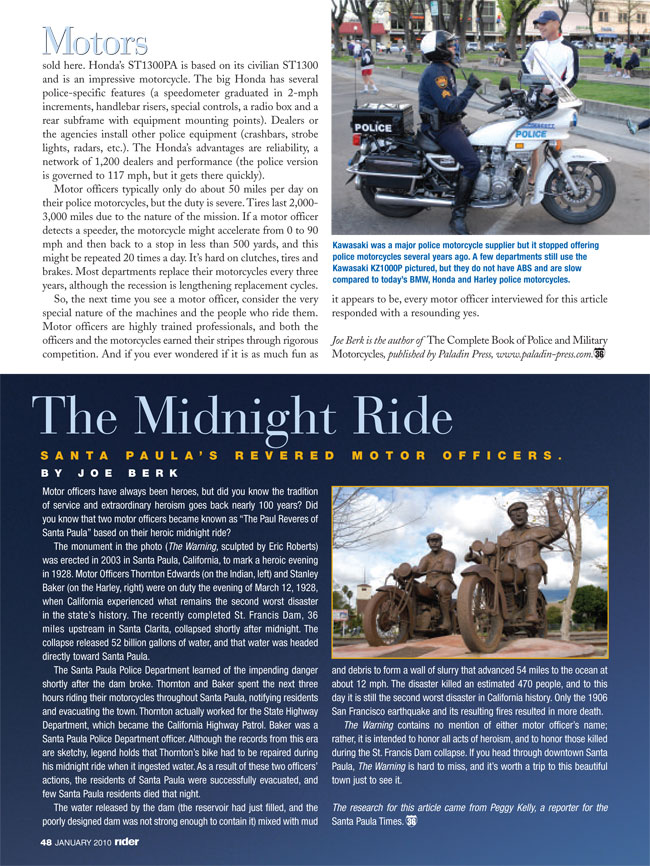 I staged one of the photos above to show a couple of San Fernando Valley police officers stopping me on my Triumph Tiger. That was one of the most interesting parts of the research. I interviewed the two SFV officers in the police station and they were regular guys. Joking, telling stories, you know the drill. I was having fun listening to them and trying to capture it all in my notes. One of the officers suggested going outside for more photos, and with that, both of them put on their helmets and sunglasses. The transformation was dramatic. With their helmets off, they were two regular (and different) guys. When the helmets and shades went on, they became RoboCop. They were indistinguishable, all business, no room for nonsense. Serious. Emotionless. No more smoking and joking. The real deal.
I staged one of the photos above to show a couple of San Fernando Valley police officers stopping me on my Triumph Tiger. That was one of the most interesting parts of the research. I interviewed the two SFV officers in the police station and they were regular guys. Joking, telling stories, you know the drill. I was having fun listening to them and trying to capture it all in my notes. One of the officers suggested going outside for more photos, and with that, both of them put on their helmets and sunglasses. The transformation was dramatic. With their helmets off, they were two regular (and different) guys. When the helmets and shades went on, they became RoboCop. They were indistinguishable, all business, no room for nonsense. Serious. Emotionless. No more smoking and joking. The real deal.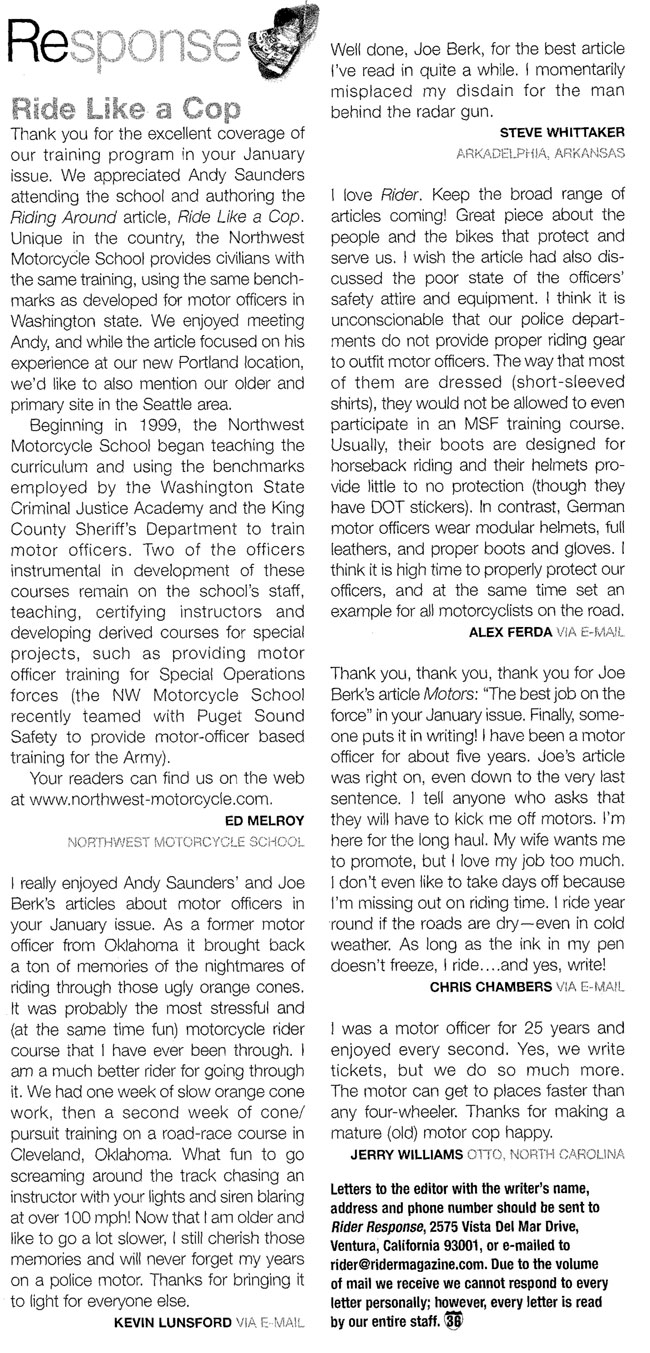 Fun times, to be sure. I really enjoyed doing that story, and before we wrap up this blog, here’s another bit of trivia: I first saw “Motors” in print while recovering from a motorcycle accident (I got busted up pretty good and I had a lot of time to catch up on my reading). The first responder on that one was Jim Royal, a La Verne, California, motor officer. Just a few weeks before my crash I shot photos of Jim for this very story. One had Jim holding a radar gun; it’s the photo you see in the article above.
Fun times, to be sure. I really enjoyed doing that story, and before we wrap up this blog, here’s another bit of trivia: I first saw “Motors” in print while recovering from a motorcycle accident (I got busted up pretty good and I had a lot of time to catch up on my reading). The first responder on that one was Jim Royal, a La Verne, California, motor officer. Just a few weeks before my crash I shot photos of Jim for this very story. One had Jim holding a radar gun; it’s the photo you see in the article above.